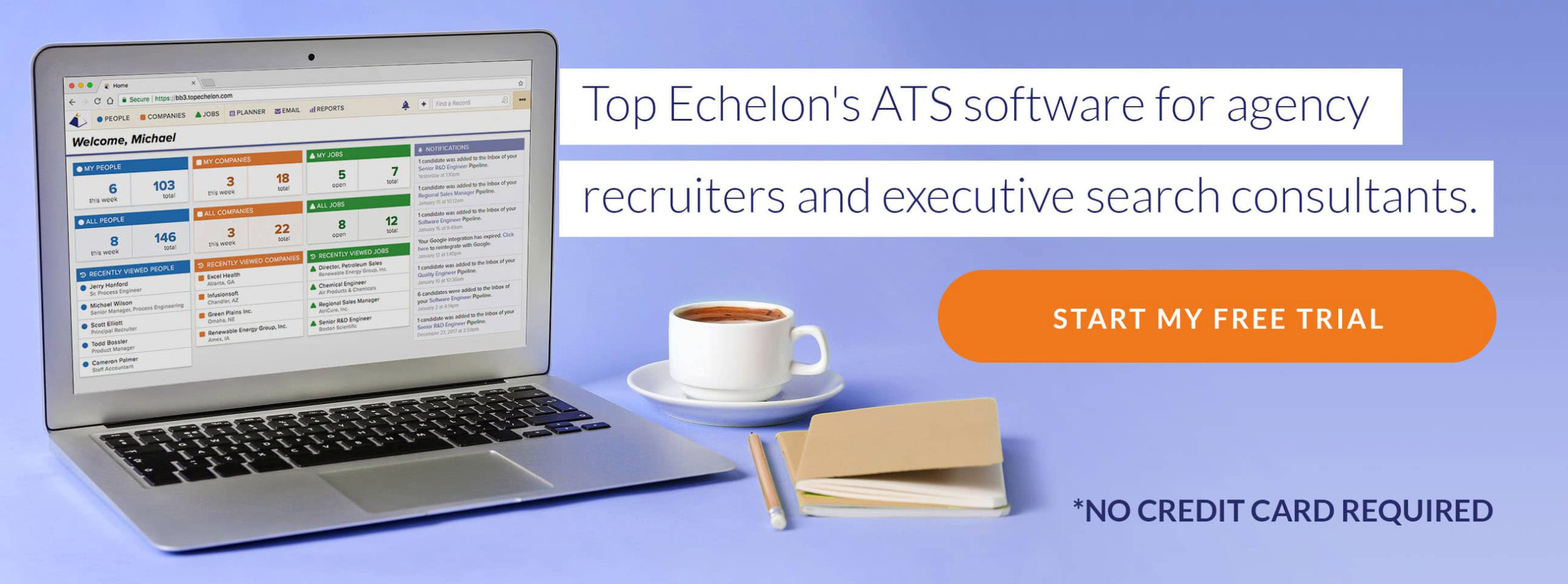To find the right candidates for your clients, you need to conduct interviews. Streamlining your interviewing process can improve your overall recruiting efforts. One tool you can use when meeting candidates is an interview scorecard.
What is an interview scorecard?
An interview scorecard is a document that helps you structure candidate interviews. It includes job-related questions that keep you on track when talking to applicants. During an interview, reference the questions and take notes on candidate responses. You and your clients can both use scorecards to interview.
Using an interview scorecard could take more time in the recruiting and hiring process. But, the benefits of the tool might be worth the extra effort. A recruiting scorecard gives a quick overview of your experience with each candidate. It helps you stay on track, get the information you need, and review answers later.
Think of the conversations you have on a day-to-day basis. You probably don’t remember every detail. Using a scorecard for conversations with candidates helps you accurately evaluate them after the interview is over.
Parts of a recruitment scorecard
To make an interview scorecard, decide which skills your client needs in a candidate. Then, create questions based off of those skills.
Use the same scorecard with each potential candidate for a job order. The scorecard also has a rating system that helps you compare candidates. You must come up with a rating system before starting the interviews.
There are three important items to keep in mind when creating an interview scorecard:
- Details being scored
- Rating scale
- Baseline for education, experience, and skills
Use the three points to create a list of questions on the scorecard. The questions should keep you focused on the client’s employment needs.
Interview scorecard sample
There is no one way to create a recruiting scorecard. Each interview scorecard should be specific to the client’s values and needs.
Take a look at the following interview scorecard template. You can use the sample to model your own scorecards.
| Item | Excellent | Good | Fair | Needs Improvement | Poor |
|---|---|---|---|---|---|
| Introduction | 4 | 3 | 2 | 1 | 0 |
| Answer to question #1 | 4 | 3 | 2 | 1 | 0 |
| Answer to question #2 | 4 | 3 | 2 | 1 | 0 |
| Answer to question #3 | 4 | 3 | 2 | 1 | 0 |
| Answer to question #4 | 4 | 3 | 2 | 1 | 0 |
| Answer to question #5 | 4 | 3 | 2 | 1 | 0 |
| Body language | 4 | 3 | 2 | 1 | 0 |
| Ending the interview | 4 | 3 | 2 | 1 | 0 |
How to use a recruiting scorecard
Using an interview scorecard helps you keep conversations on track. But, you don’t want to make the recruiting scorecard the star of the interview. Keep your focus on the candidate throughout the meeting. Here are a few key points to remember when using a scorecard.
1. Involve the candidate in the scorecard
Explain scorecards to candidates before the interview. If you start asking questions and taking notes without acknowledging the scorecard, a candidate might get uncomfortable. Let the candidate know you’ll be using the scorecard to ask questions and review their answers.
2. Engage with the candidate
Don’t overlook the power of body language. Since you’re using a reference during the interview, your eyes might tend to look down at the scorecard. This could make the candidate feel uncomfortable or ignored. Increase engagement by making eye contact throughout the interview, listening to their responses, and taking notes quickly.
3. Integrate scorecards with other tools
Use the interview scorecard template with your applicant tracking system (ATS) and other recruiting tools. An ATS helps you source and organize candidates. Often, your applicant tracking system includes features like resume parsing and importing data. Use the information from the interview scorecard in your ATS to find and categorize candidates.
Why use interview scorecards?
If you don’t keep score during interviews, how do you know which candidates come out on top? Don’t just “go with your gut” to place candidates. Instead, use measurable data. Here are just a few ways interview scorecards can improve your recruiting efforts.
1. You are more likely to stay focused
An interview scorecard gives you a guide to follow as you interview candidates. It can help you avoid getting off topic and wasting time during the interview. You are more likely to take away key details about the candidate by using a recruiting scorecard.
2. It encourages fairness and consistency
When you use an interview scorecard, you ask the same questions to all candidates for a job order. The consistent questions and rating system make it easy to compare candidates.
3. You understand what kind of candidate you need
To create a recruiting scorecard, you must figure out the skills your client needs. This process helps you and your client define the right applicant. You can begin your search with a clear picture of the ideal candidate and follow that image throughout the employee placement process.
4. Protect you from lawsuits
If a candidate feels unjustly disqualified from a job running, they might seek legal action. The scorecard is documentation of the interview that shows you did not discriminate. The supporting document makes it more likely for you to win the case.









